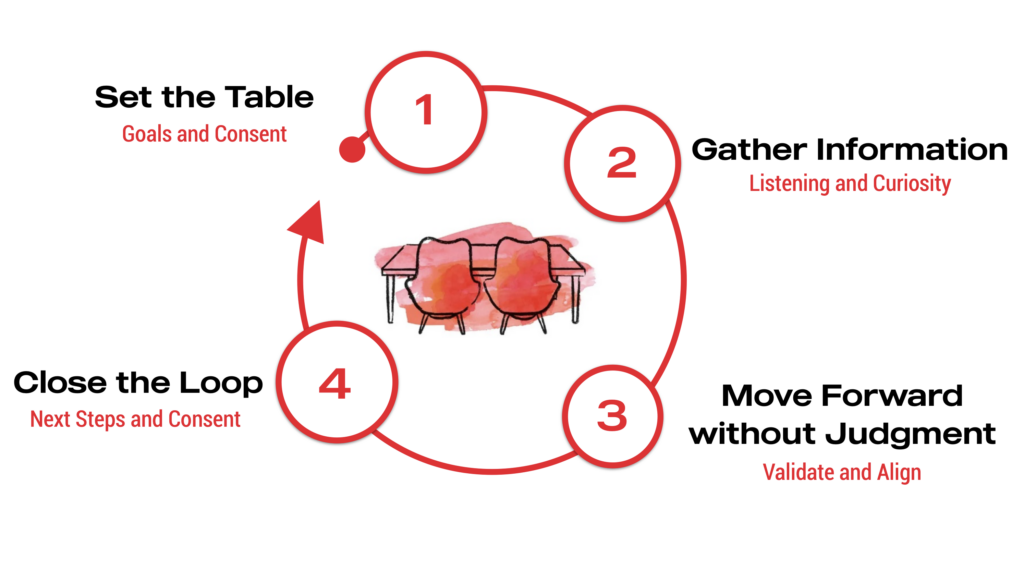Standing Up to Bullies
Today, it’s personal.
Someone I know very well, went on maternity leave.
She is a brilliant, hard-working, and kind human being who works in a high stress, high performance position, typically dominated by white men. The mountains she had to climb to get there were significant.
During her maternity leave she found out, through a trusted colleague, that one of her peers, a young, single man, was making subtle but disparaging remarks about her. He was directing these remarks to the leadership team.
I have two children of my own, and I have seen the toll that growing a person and then forcibly ejecting it from one’s body can have on someone. It is physically, mentally, and emotionally exhausting. In the midst of recovering from that and living as a sleep-deprived source of food, no one should have to take on the additional burden of having their livelihood threatened, especially behind their back.
So, today I’m going to answer two questions:
- What to do in this situation, if it’s you.
- What to do in this situation, if it’s happening to one of your colleagues.
✉️ Get the Infinite Impact
Join thousands getting weekly wisdom on unlocking hidden potential, building meta-abilities, and creating meaningful change through practical frameworks you can use immediately.
But first, let’s quickly talk about harm reduction…
On this blog, I talk about the process of Becoming Superhuman. As such, our intention should never be to harm others. Instead, we seek to find effective solutions that prioritize kindness, safety, and equity. We seek to reduce harm.
So, while I am legitimately enraged that someone would do this to someone I care about, I also need to remember that my anger is not a justification to harm this person, nor does it improve our chances of reaching an effective solution.
Additionally, I’m also keenly aware of how many of the problems we face are structural in nature, rather than individual failures. This means that we must see people in the context of their surroundings, and look to find structural solutions paired with individual accountability.
All of this means that, as much as we’d rather not, situations like this require us to engage our empathy muscles. We must first try to understand where this person is coming from. Doing this puts us in a much better position to establish an effective strategy.
1. What to do in this situation, if it’s you.
Chances are, the person who is making the disparaging remarks is looking out for themselves. Perhaps their behavior isn’t even deliberate so much as it is a product of their circumstances.
- They may have been encouraged throughout their life to be aggressive and push for what they want.
- Since they are single, they may be looking to climb the ladder and advance quickly in order to feel like a more attractive option on the dating market.
- They may feel compelled to succeed as a result of the burden placed upon them by the expectations of their parents and grandparents.
None of this excuses their behavior, but it does offer an alternative narrative of explaining their behavior instead of deliberate malice. Thinking about this, we can prepare ourselves to have a powerful and effective conversation that models for them the sort of kindness and empathy we can only hope they learn to incorporate.
I believe the best course of action is to confront this person using the Sitting on the Same Side of the Table conversation framework from my book, *The Lovable Leader.*
I recommend addressing this person directly, and ideally face-to-face. Doing this accomplishes two things:
- they will be forced to consider the human they’ve been inflicting reputational harm upon
- they will have to either deny, explain, or take accountability for their alleged words and actions
It’s easy to pick apart people’s words in an email and send back a fiery reply. It’s easy to talk about someone when you don’t have to say it to their face. But when you are called to looking into the eyes of the person you are harming and explain your behavior, it is often a sobering wake up call, even for bullies.
The Framework
The simplified 4-step framework is this:

Using this framework, it’s important that you maintain the driving role in the conversation instead of being put on defense.
By asking the questions and sitting comfortably in silence during the conversation, you position yourself as the driving force of the conversation.
The Script
Step 1. Set the Table
Hi [person who keeps bad-mouthing me behind my back],
Thanks for taking the time to jump on this Zoom with me.
My goal for this conversation is to share with you something that has been bothering me for a little while and has recently come up again while I’ve been on maternity leave. My hope is that by talking through this, that we can resolve any misunderstandings and get our working relationship back on track.
I have noticed, on several occasions, you have said things to our colleagues and our leadership team that frame me in a negative light. I’m not sure if you’re doing this consciously, but I want to talk about this because I feel that it has the potential to severely harm our working relationship, as well as me personally.
One recent example was [example 1].
More concerning, was finding out that while I’ve been out on maternity leave, you have made other comments in my absence, while I’m not even there to add context or defend myself.
I don’t want to attribute malicious intent to your behavior, but I wanted to bring it up so I could better understand what’s happening.
I promise to keep an open mind and hear your side of this.
Step 2. Gather Information
[Person proceeds to talk]
[You ask follow up questions for clarity]
Can you say more about that?
Help me understand what you mean by that.
How do you think we might work together more effectively so that these sorts of situations could be avoided in the future?
Step 3. Move Forward without Judgement
Thank you for sharing all of that with me.
While I might not agree with everything you’ve said, I can at least understand how you could see things that way.
Obviously, both of us want to succeed in our respective careers.
Based on everything you’ve said, I imagine that you want to stand on your own merits just as much as I do. I don’t want you to lose your job, just as I’m confident you don’t want me to lose my job and all of the security and benefits it affords me and my family.
I think it’s also safe to say that neither of us wants to go through our role with a target on our back. I don’t think either of us can do our best work when we’re constantly in fear of someone else looking for any little mistake to point out. I certainly don’t want to expend any energy trying to tear down your accomplishments.
Step 4: Close the Loop
So, I just want to say thank you again. I appreciate you having this conversation with me and thank you for your openness and honesty. I feel better about the remainder of my maternity leave now that you and I have talked. Coming out of this conversation, I hope you share my commitment for both of us to succeed.
I appreciate your willingness to be more considerate of how I’m being talked about especially when I’m not present.
Have a great rest of the day.
Note: If the person turns out to be hostile, malicious, or otherwise unreceptive to this approach, then things would likely need to be escalated. Given HR’s role in protecting the company, a positive outcome is questionable.
2. What to do in this situation, if it’s happening to one of your colleagues.
I’ll keep this part short.
If you find yourself in the presence of someone who is bad mouthing a colleague who isn’t there to defend themselves, shut that down.
This is especially true if you are a leader either by title or by mindset.
What you allow, you implicitly endorse.
Do not allow teammates to talk about one another behind their back.
Any criticism or judgment should be said directly to one another.
Hey [trash-talker], I see you have strong opinions about this. However, it’s important that we avoid assigning blame or sharing anecdotes while [person] is out on leave. I’m sure you, like everyone else, would appreciate the opportunity to be present when being talked about. Let’s wait until [person] can be here to participate in this conversation.
If the person being disparaged is out on maternity leave, medical leave, bereavement, or even vacation, the response should be even more forceful so that everyone can know that they’re able to feel completely safe while out of work.
Hey [trash-talker], [person] is out on maternity leave.
As a company we’ve made the decision to honor that time away from the office by respecting their right to recover without worrying about what might be said about them while they are not here.
Is that something you’re comfortable agreeing to?
Dealing with Bullies
Some bullies are bullies on purpose.
Some don’t even know they’re doing it.
In either case, someone needs to stand up to them.
Sometimes it will have to be you, but in the best case scenario, you’re not alone.
Whenever we stand up to bullies, we should try to do it with the kindness and empathy we would want them to model. We want to give them the chance to do the right thing.
Hopefully, they’ll surprise us. After all, they’re still only human.
I hope you enjoyed this post!
If this is your first time here or you haven’t yet become a subscriber… click here to get both Becoming Superhuman and The Infinite Impact Newsletter
If you’re already a subscriber… consider becoming a member to support this work and get all sorts of other benefits.
I hope you enjoyed this post!
If you liked this post, then you will LOVE my newsletter (The Infinite Impact)
and my learning community (The Superhero Institute).


